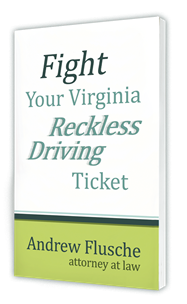What Is Aggravated DUI in Virginia?
Conviction of driving under the influence (DUI) can seriously affect your life, especially if you have to spend time in jail, pay a hefty fine, or lose your driver’s license.
When the circumstances of your DUI include certain aggravating factors, the punishment you face becomes harsher. Being charged with an aggravated DUI in Virginia can mean significant jail time and up to a $2,500 fine.
The lawyers at Flusche & Fitzgerald are passionate about defending against DUI charges.
Our founder, Andrew Flusche, has been defending clients for over 15 years.
Andrew’s partner, Ryan Fitzgerald, has 12 years of experience as a prosecutor and brings valuable insights gained from sitting on the other side of the courtroom and learning how the prosecution thinks.
We are passionate about fighting for the little guy and protecting our clients from being taken advantage of in the court system.
What Is a DUI in Virginia?
Under Virginia law, the Commonwealth can charge you with DUI when you drive under the influence of alcohol, drugs, or a combination of alcohol and drugs that impair your driving. You can also be charged with a DUI if a blood test shows you have:
- A blood alcohol concentration (BAC) of 0.08% or higher,
- A blood concentration of 0.02 milligrams or higher of cocaine,
- A blood concentration of 0.1 milligrams or higher of methamphetamine,
- A blood concentration of 0.01 milligrams or higher of PCP, or
- A blood concentration of 0.1 milligrams or higher of MDMA.
DUI is a Class 1 misdemeanor with a mandatory minimum fine of $250. When you are convicted of DUI, your driver’s license is automatically suspended for one year.
What Is an Aggravated DUI in Virginia?
An aggravated DUI occurs when you commit a DUI in circumstances the Commonwealth has concluded warrant more severe punishment. Aggravated factors include:
- A particularly high BAC;
- A history of DUI convictions;
- A history of DUI-related convictions; or
- The presence of a minor in the vehicle.
Aggravated DUI carries higher penalties and more severe consequences.
What Is the Punishment for Aggravated DUI in Virginia?
A big question when you are charged with a crime is usually how serious the crime is.
Being convicted of a DUI with aggravating factors typically results in higher fines, longer jail sentences, and the potential for the permanent revocation of your license.
But is aggravated DUI a felony? There are circumstances when aggravating factors turn a DUI into a felony, including on third or subsequent convictions and convictions following certain DUI-related offenses.
High BAC
If your BAC is 0.15% to 0.20%, you must stay in jail for at least five days. If your BAC was higher than 0.20%, you must stay in jail for a minimum of 10 days. These punishments increase if this is not your first offense.
History of DUI Convictions
The impact of past convictions depends on the number of prior convictions and how recent they were.
Punishments for subsequent offenses are typically distinguished between convictions in the last 5 years and convictions between 5 and 10 years ago. If your last DUI conviction was more than 10 years ago, it is not an aggravating circumstance for a second or third offense.
Second offenses
If you were convicted of DUI in the last 5 years, a second conviction could result in a jail term between 1 month and 1 year and a minimum fine of $500. You must serve a minimum of 20 days.
If you were convicted of DUI more than 5 but less than 10 years ago, you must pay a minimum fine of $500. You may be sentenced to jail for a month or longer and must serve at least 10 days.
In either situation, if your BAC was 0.15% to 0.20%, you must serve an additional 10 days in jail. If your BAC was 0.20% or higher, you must serve an additional 20 days and pay a $500 fine. Your license will also be suspended for three years.
Third offenses and beyond
If you have been convicted of two DUIs in the last 10 years, a third conviction is a Class 6 felony carrying a mandatory minimum 90-day jail sentence. If all three offenses were committed in a 5-year period, the minimum jail sentence becomes 6 months. You must also pay a $1,000 fine.
Upon conviction of a third offense, the Commonwealth revokes your license indefinitely and possibly permanently. And, if you solely own and operate the vehicle involved, the government may seize it.
If you commit a fourth offense, you must serve at least 1 year in jail and pay a minimum $1,000 fine. The same punishments apply regardless of whether the fourth offense occurs within the same 10-year period.
History of DUI-Related Convictions
When the Commonwealth charges you with DUI, they can also charge you with additional DUI-related crimes depending on the circumstances, including:
- Causing serious bodily injury while driving intoxicated,
- Causing serious bodily injury while operating a boat intoxicated,
- Killing someone while driving intoxicated, and
- Killing someone while operating a boat intoxicated.
In Virginia, your penalties for DUI and related offenses could run simultaneously. If you have been convicted of any of these prior offenses, regardless of how long ago, and you are convicted of DUI, you commit a Class 6 felony. You must serve a minimum jail sentence of one year and pay a minimum fine of $1,000.
Driving with a Minor Present
If a minor was present when you committed a DUI, you must pay an additional fine between $500 and $1,000 and serve a minimum 5-day jail sentence. This added punishment applies regardless of whether the driver was also a minor.
Aggravated DUI Defense
Being convicted of DUI can have serious and far-ranging consequences. You may spend time in jail, pay substantial fines, and face license suspension or revocation.
If you are facing a charge of aggravated DUI, contact Flusche & Fitzgerald today. We focus on driving charges, especially DUI defense. We are passionate about defending the little guy and helping our clients reduce the negative impacts of DUI charges.





